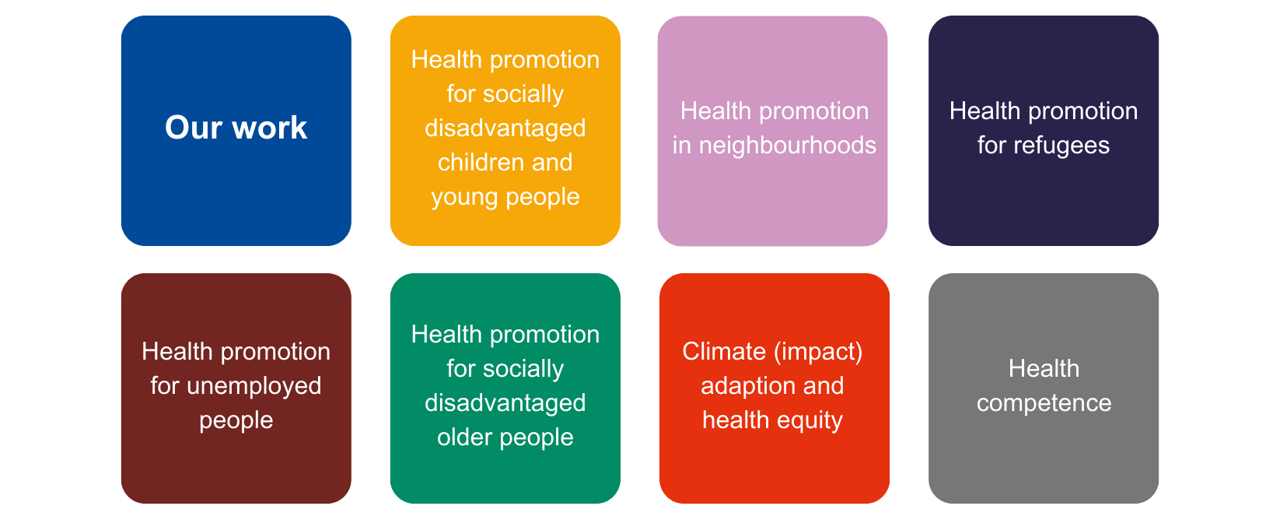GERMAN COLLABORATIVE NETWORK FOR EQUITY IN HEALTH
Who we are
The collaborative network was initiated by the Federal Centre for Health Education (BZgA) in 2003. It is supported by the cooperation between the BZgA, all state associations for health, all central associations of the statutory health insurance funds, other health insurance funds, the central municipal associations, the Federal Employment Agency, the federal associations of the medical profession, five welfare organisations and three state ministries. The work of the network is supported by an advisory working group of experts from science and practice.
The central aim is to strengthen and disseminate good practice in health promotion projects and measures for the socially disadvantaged.
One focus of the work is the selection of examples of good practice in social situation-related health promotion (www.gesundheitliche-chancengleichheit.de/good-practice). The examples selected based on practical criteria are intended to motivate imitation and thus support the process of quality improvement.
- A detailed description of the Collaborative Network is available in English: Andreas Mielck, Holger Kilian, Frank Lehmann, Antje Richter-Kornweitz, Lotte Kaba-Schönstein (2016): German cooperation-network “equity in health” - health promotion in settings. Health Promotion International, doi:10.1093/heapro/daw069. View the abstract to the article here.
We work towards
- Disseminating Good Practice in Germany. The experience gained in Good Practice projects, programmes and networks offers valuable ideas for the further development of social status-based health promotion.
- Creating transparency and making the diversity of practice more visible. The website contains comprehensive information on social status-based health promotion, references to events, and interactive offers of professional exchange. One essential element of the Internet platform is the nationwide practice database, where more than 3.000 projects, programmes and networks can be searched online.
- Promoting regional networking and the exchanging of experience. With its Coordination Centres for Equity in Health, the Cooperation Network has an established structure in almost all federal states. The Centres support the transfer of information between the numerous players in their federal states, as well as collaboration between the federal levels. Not least, they also advance quality development in social status-based health promotion.

Our work
Partners
Partners of the Collaborative Network for Equity in Health are national and regional institutes, academic and research centres, national and regional authorities, and government departments. In total, more than 70 partner organisations are represented in the Collaborative Network.
- The partners´"Declaration of Cooperation (PDF)", renewed in 2021
PARTNER PROCESS "HEALTH FOR ALL"
Municipal strategies for healthy living
Most boys and girls in Germany grow up healthy. However, 15 to 20 per cent of children and adolescents have poorer health or at least an increased risk of becoming ill. (Federal Ministry of Health [Ed.] [2010]: Nationales Gesundheitsziel. Gesund Aufwachsen: Lebenskompetenz, Bewegung, Ernährung. Berlin: 7). These children and young people often live in difficult social circumstances. Their environment often lacks incentives and support for their development. This can have a negative impact on their current and future health from birth. Poverty-related health problems can accumulate over the course of a lifetime. Particularly serious in this context are health problems that have already arisen in the womb or in early childhood. (Dragano, N. [2007]: Gesundheitliche Ungleichheit im Lebenslauf, in: Aus Politik und Zeitgeschichte 42/2007, p. 18-25.: 19ff).
Therefore, the municipal partner process "Health for All" was launched 2011 (www.gesundheitliche-chancengleichheit.de/partnerprozess). It supports and assists municipalities in establishing and expanding integrated municipal strategies for health promotion, so-called "prevention chains". These are intended to improve the conditions for a long, healthy, and equitable life for all people in the community, regardless of their social situation. The core of the offer is the professional support provided by the Coordination Centres for Equity in Health in all federal states.
Many partners are gathering experience in implementing the recommendations for action (download as PDF file), exchanging this and using their findings to develop integrated health strategies ("prevention chains") in their communities to reduce socially determined inequalities in the health opportunities of children and young people.
Coordination Centres for Equity in Health
In order to support networking at federal state level, coordination centres for equity in health have been set up (www.gesundheitliche-chancengleichheit.de/koordinierungsstellen). Their task is to stimulate exchange and cooperation between stakeholders at federal state and municipal level, to identify and disseminate good practice projects and thus promote quality development.
The Coordination Centres for Equity in Health (in German Koordinierungsstelle Gesundheitliche Chancengleichheit, KGC) in all federal states
- Support networking in social-situation-related health promotion on state level
- Provide advice and support for municipalities which establish and expand integrated municipal strategies
- Contribute to further development of the practice
- Promote equity in health
GOOD PRACTICE IN SOCIAL SITUATION-RELATED HEALTH PROMOTION
Good practice is an internationally used term in the field of quality development for which there is no standardised, binding definition. Good practice can be understood both as an approach to describing examples of good practice and as a set of criteria that characterise this good practice.
In German-speaking countries, the Federal Centre for Health Education (BZgA) and the Collaborative Network for Equity in Health have developed the topic of good practice for social situation-related health promotion.
The good practice approach of the Collaborative Network is intended to support stakeholders in social situation-related health promotion in continuously developing the quality of their activities and services.
The Good Practice Criteria
Since 2003, 12 Good Practice Criteria for reducing social disadvantage in health promotion have been developed by a group of experts (advisory working group) with reference to national and international knowledge bases and experience.
The twelve criteria provide a standardised understanding of what constitutes good health promotion to improve health equity.
- The presentation "Good Practice Database" (PDF)
- The brochure “Criteria for Good Practice in Health Promotion” (PDF)
